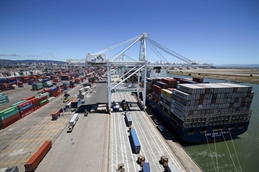
Port of Oakland recently reported its volumes increased in January showing signs of recovery from last year's slump due to the trade war between the US and China.
In a statement, the major west coast port said its containerized import volume jumped 7.3% last month over January 2019 totals. Exports were up, too, the port said, lifting hopes for recovery from a US-China trade war.
The port raised concern however over the fast-spreading coronavirus dampen trade growth.
“It’s possible,” said Port of Oakland Maritime Director John Driscoll. “The uptick in January was encouraging but we’re hearing from shipping lines that cargo volume could moderate over the next few months.”
Oakland’s year-over-year import volume increase in January followed three straight months of decline.
Exports rose 3.3% in January, up for the fourth straight month. The Port said consumer demand – both in the US and Asia – spurred cargo volume increases.
The Port’s results followed a January trade agreement signaling a break in the US tariff skirmish with China. The agreement included a commitment by Beijing to increase purchases of US farm goods – which was good news for California and Midwest agricultural exporters who use Oakland’s port as their gateway to Asia.
Coronavirus to dampen trade growth
Port of Oakland noted though that the coronavirus outbreak that was first discovered in China, blurs the trade outlook.
"Quarantines and other emergency measures have slowed Chinese manufacturing output, according to reports. As a result, shipping lines are canceling some springtime voyages to the US," the statement said.
The Port noted that it could take several months to determine the impact of the contagion on global supply chains.
The Port reported that its total January cargo volume – including imports, exports and empty container repositioning – declined 0.6%. It said that it handled 17.7% fewer empties in January than in the same period last year.




